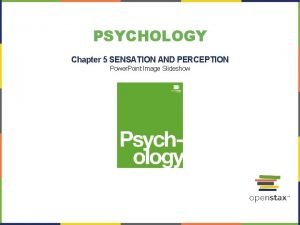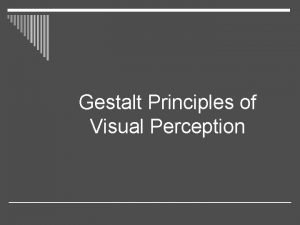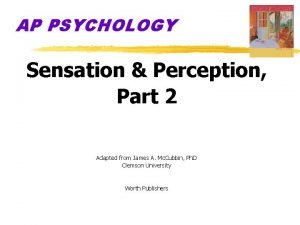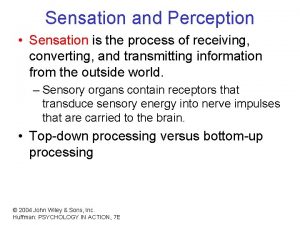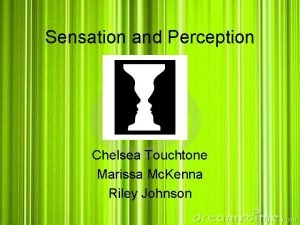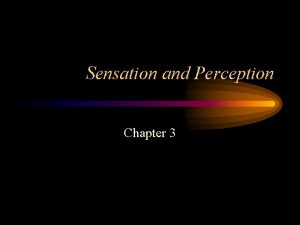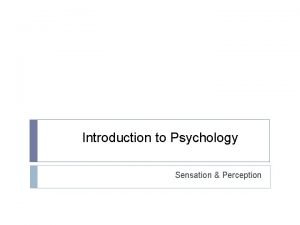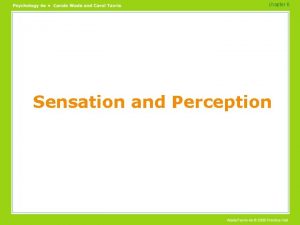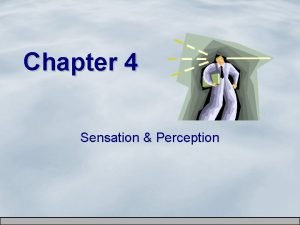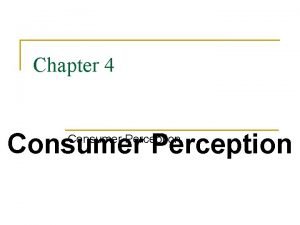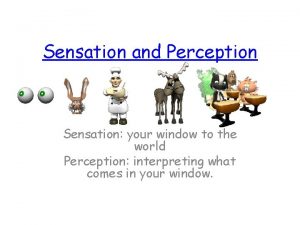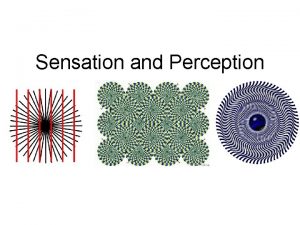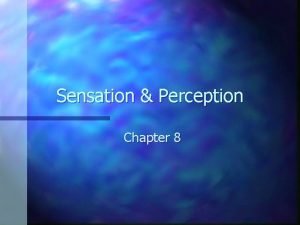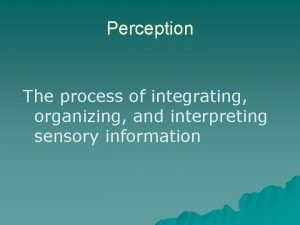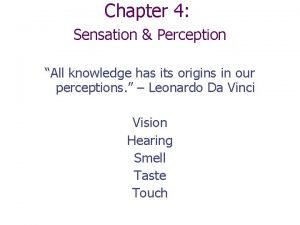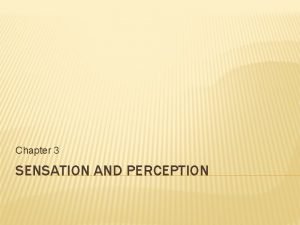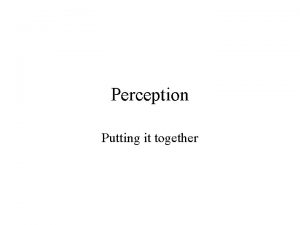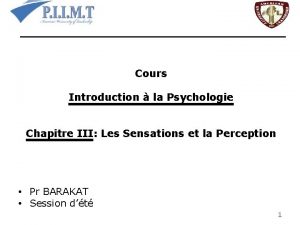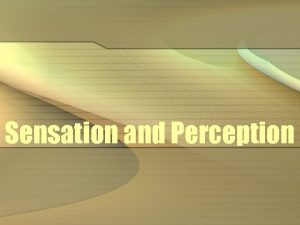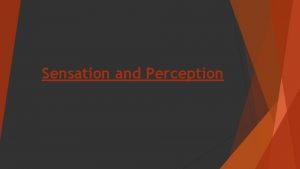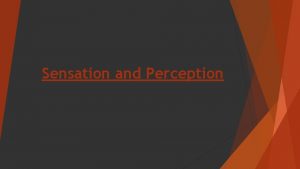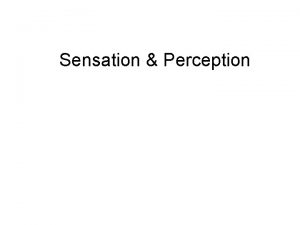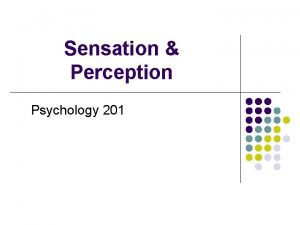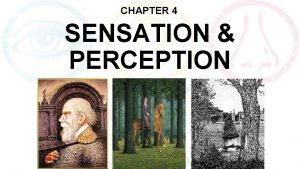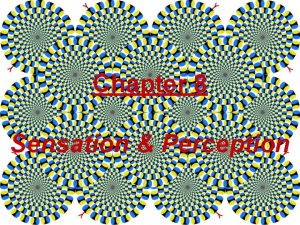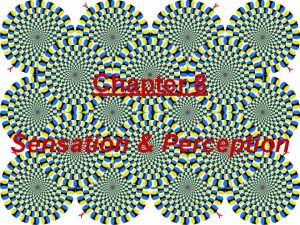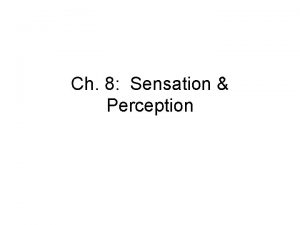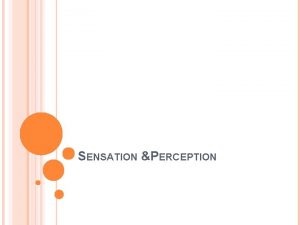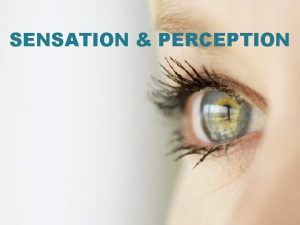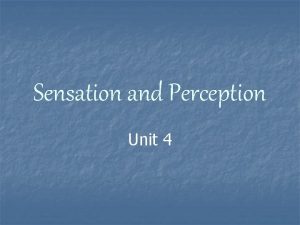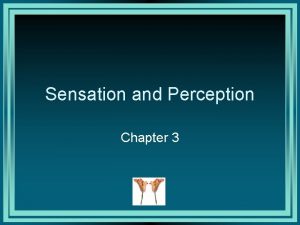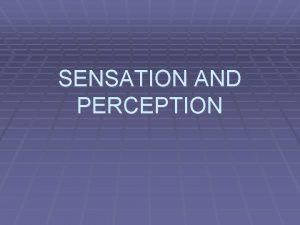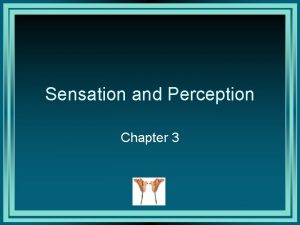Sensation and Perception Sensation and Perception Sensation your


















- Slides: 18

Sensation and Perception

Sensation and Perception Sensation: your window to the world Perception: interpreting what comes in your window. (you are sensing and perceiving right now by reading this!)

Sensation detecting physical energy from the environment and encoding it as neural signals (associated with bottom-up processing)

Perception selecting, organizing, and interpreting our sensations as meaningful objects and events (associated with top-down processing)

Sensation and Perception WORK TOGETHER!!! • Examples: – Hearing – you “sense” the noises the vocal tract makes when a person speaks, you “perceive” the meaning of what those noises represent – Health Problem – you “sense” sudden pain in your heart, you “perceive” by recognizing you are suffering a heart attack

ATTENTION! • I am going to show you a picture… what’s the FIRST thing you notice? • Half of the class needs to cover their ears while I make an announcement before displaying the picture…


Bottom-Up Processing • Also called feature analysis. • Analysis that begins with the sensory receptors and works up to the brain’s integration of sensory information

Top-Down Processing • Guided by higher-level mental processes, such as experience, motivation, and expectations • If you see many old men in glasses, you are more apt to process a picture of an old man (even when you may be in error).

BOTTOM-UP PROCESSING: **detecting lines, angles, and colors that form the horses, riders, and surroundings TOP-DOWN PROCESSING: **consider the painting’s title, notice the apprehensive expressions, and attend to aspects that give meaning

The Impossible Tune • Listen to the clip… • After I play it, take 30 seconds and THINK about an explanation… • Remember, we’re talking about SENSATION and PERCEPTION!!! How might they explain?

Perceptual Interpretation § Perceptual Adaptation § (vision) ability to adjust to an artificially displaced visual field § prism glasses demonstration § Inverted image Video

Psychophysics and Transduction • Psychophysics: the study of how physical energy relates to our psychological experience • Transduction: conversion of one form of energy into another • Information goes from the senses to the thalamus, then to the various areas in the brain. Remember Ethan in Sky High. He changes his body to slime. Solid form to liquid form. Change from one form of energy to another.

Hearing Threshold Partner Activity Absolute Threshold the minimum stimulation needed to detect a particular stimulus 50 percent of the time • A single candle flame 30 miles away • A drop of perfume in a six-room apartment • a ticking of a watch from 20 feet away • The pressure of a wing of a bee falling on our cheek

Difference Threshold (Just Notable Difference) the minimum difference a person can detect between any two stimuli half the time Weber’s Law: difference thresholds differ by a constant percentage rather than amount **exact proportion varies by stimulus: weight must differ by 2%; light intensity by 8%

Signal Detection Theory • predicts when we will detect weak stimuli amid background noise • Things like motivation, experience, expectations, or physical state can effect what we sense A mom might sleep through a thunderstorm, but if one of her sons even whimpers, she is up!!!

Subliminal Messages Play “Help” backwards "Now he uses marijuana. “ • Stimuli below our absolute threshold. • We unconsciously sense it • Do Subliminal Messages work? • To an extent… they can prime your later behavior to a very small degree

Sensory Adaptation • diminished sensitivity as a consequence of constant stimulation • Purpose is to help us focus on changes in our environment Do you feel your underwear all day? – Water is cold at first but then you get used to it! – Hear the “buzz” of a powered TV at first, but then goes away – Why doesn’t our vision go away? ?
 Chapter 5 sensation and perception
Chapter 5 sensation and perception Gestalt principles of sensation and perception
Gestalt principles of sensation and perception Perceptual set ap psych
Perceptual set ap psych Perception vs sensation
Perception vs sensation Sensation and perception crossword review
Sensation and perception crossword review Chapter 3 sensation and perception
Chapter 3 sensation and perception Sensation and perception
Sensation and perception Chapter 6 sensation and perception
Chapter 6 sensation and perception Chapter 4 sensation and perception test
Chapter 4 sensation and perception test Perceptionn
Perceptionn Webers law
Webers law Opponent process theory
Opponent process theory Chapter 6 sensation and perception
Chapter 6 sensation and perception Sensation perception
Sensation perception Sensation and perception uu
Sensation and perception uu Chapter 4 sensation and perception
Chapter 4 sensation and perception Chapter 3 sensation and perception
Chapter 3 sensation and perception Sensation vs perception
Sensation vs perception Exposé sur la sensation en psychologie
Exposé sur la sensation en psychologie
